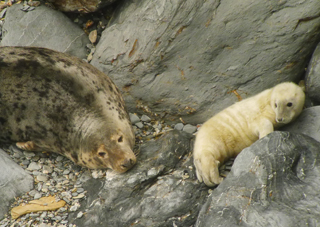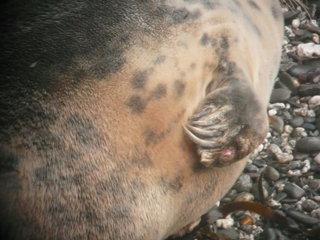 A press release by the Cornwall Wildlife Trust has asked us to be vigilant with regards seals this season.
A press release by the Cornwall Wildlife Trust has asked us to be vigilant with regards seals this season.
The Seal pupping season has started and seals really need your help! Cornwall’s leading environmental organisations have joined forces to create a much needed Coastal Code of Conduct to help guide the public towards a safer future for our marine and coastal wildlife, which includes understanding how to behaviour around our fantastic grey seals that inhabit our coastline and pup on secluded beaches, particularly this time of year.
Together these organisations, which include Cornwall Wildlife Trust, RSPB, and of course Cornwall Seal Group, have set up the Marine Disturbance 24 hour Hotline on 0345 2012626, and the Coastal Code of Conduct web pages (www.cornwallwildlifetrust.org.uk/coastal_code), containing information on how to enjoy the coast and yet protect the wildlife that exists there at the same time.
Seals are generally relaxed creatures preferring the quiet life! They go with the flow floating onto rocks to rest and digest their food and then off on the next tide. Increasingly their experience becomes one of blind panic as they are suddenly woken with a start by a human too close by for comfort. Seals suffer accidently at the hand of humans and whilst some effects are dramatic, others are not.
 Sue Sayer, Coordinator of Cornwall Seal Group told Roseland Online,
“At worst, seals have been hit by fast travelling boats or slashed by propellers, but most of the negative effects that people have on seals are far less obvious or even invisible. A panic reaction is associated with a flight response and hormone release. A seal on land may rush to the relative safety of the sea and this changes their ideal resting routine and upsets their energy budget. A seal that hauled onto land on a high tide, may be woken by the smell, sight or sound of people, only to find that the sea is now far away, forcing it to rush over rocks and boulders, ripping out claws or gashing its belly as it goes.”
Sue Sayer, Coordinator of Cornwall Seal Group told Roseland Online,
“At worst, seals have been hit by fast travelling boats or slashed by propellers, but most of the negative effects that people have on seals are far less obvious or even invisible. A panic reaction is associated with a flight response and hormone release. A seal on land may rush to the relative safety of the sea and this changes their ideal resting routine and upsets their energy budget. A seal that hauled onto land on a high tide, may be woken by the smell, sight or sound of people, only to find that the sea is now far away, forcing it to rush over rocks and boulders, ripping out claws or gashing its belly as it goes.”
Although not all seals are equally affected by people, some groups are more vulnerable to having their resting routines upset…heavily pregnant mothers carry their pups in their bellies and the consequences of a dash over rocks can be doubly fatal. Mums may be scared away from their pups, who then end up starving to death. Young seals that are teaching themselves to feed have few fat reserves to spare and they naturally choose remote Cornish beaches to rest and digest their food. The presence of people can scare them into the sea tipping the balance beyond recovery. These effects may be felt weeks or months after the disturbance incident and cumulatively can be fatal.
Sue added, “If you are out on the water – watch the reactions of any seals you see! If they are repeated looking at you – you are already too close. If seal moves to the sea, you must back away to avoid them rushing to the sea and so being affected by your presence. Maintain a constant, slow course, parallel to the shore and ideally at least 50m from the seals. Always aim to leave seals as you found them….no matter what the reason, any seal entering the sea in your presence will have had its resting and energy routines interrupted and you might not be the only people they have encountered that day!”
Cornwall Seal Group has shown, at their main study site, that the frequency of ‘worst case’ incidents of seals being flushed into the sea has increased from one every 8.5 minutes to one every 7 minutes. This is not sustainable.
To find out more, Cornwall Wildlife Trust (CWT) have set up a website www.cornwallwildlifetrust.org.uk/coastalcodefor the public, plus a 24 hour Marine Disturbance Hotline on 0345 2012626. We want members of the public to report any instance of disturbance they see, with video or photographs if at all possible and safe and each instance will be logged to help us understand and better tackle the issue. So if you are a regular coastal user and you see seals being flushed into the sea anywhere around Cornwall, for whatever reason, please ring to get the event recorded. Thank you for helping seals!

